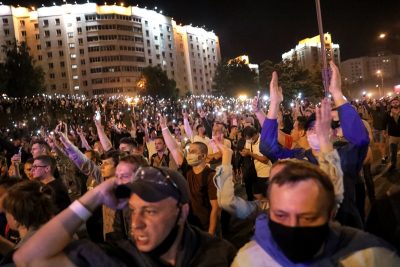Lukashenko Wins the Election, but His Biggest Fight May be Yet to Come

Belarus’ Alexander Lukashenko may have won a solid victory with 80.23% of the vote, according to the election commission, but the ground on which he is standing is not as firm as it once was. The President of Belarus says a hybrid war is being waged against his nation by outside forces; opposition activists claim he has rigged this weekend’s election result.
A night of protests followed the presidential election vote, after which opposition candidate Svetlana Tikhanovskaya, rejected her meagre 9.9% of the vote, stating ‘I will believe my own eyes – the majority was for us’. Tikhanovskaya, the wife of a YouTube blogger who was prevented from running in the election, has no previous political experience, but her message of change for Belarus and dissatisfaction with the current leadership clearly resonated with many.
The fact that a Belarussian housewife managed to pose any threat at all speaks volumes about the fragility of Lukashenko’s position. The President’s words and actions of late have raised eyebrows across the international arena, including surprise and dismay from Russia, after he accused his ally of sending mercenaries to support the opposition in the run-up to the election. Russian journalists from various news outlets were also held by police.
Russia’s President Putin, forever the diplomat, congratulated the Belarussian President with his election win and said that he was counting on the further development of mutually beneficial relations between the two nations. Gently reminding Lukashenko of their joint responsibilities as participants of the Eurasian Economic Union and also their military ties in the Collective Security Treaty Organization, he spoke of Russia and Belarus as ‘brotherly nations’ with mutual goals. Nevertheless, the protests which have dominated the headlines in the last days will perturb the Kremlin. It is neither in Russia’s or Belarus’ interest to see the instability which raged in Ukraine after the Euromaidan protests took hold in 2014, leading to a disastrous power grab by the opposition. And yet this election campaign in Belarus has unleashed widespread exhibitions of social discontent which are proving difficult to pacify.
Levels of dissatisfaction with the current leadership peaked earlier this year as the coronavirus pandemic took hold in the country. President Lukashenko initially refused to accept the disease existed, branding the virus back in April as a ‘psychosis which will benefit some people and will harm others’. When questioned on his participation in an ice hockey game in the midst of the pandemic, he responded in an extraordinary way by saying ‘there are no viruses here, have you not seen that there are none flying about?’. As the death toll began to rise, Belarussians began to take matters into their own hands, maintaining social distancing and closing down cafes and restaurants of their own accord.
With no lockdown imposed it is surprising that the number of cases in Belarus has not exceeded the official 68,947 to date. But doubt has been cast on the reliability of official data. Earlier this year, a Russian journalist for Channel One reported on the lack of trust Belarussians had in official information on coronavirus as he showed footage of an abundance of freshly dug graves in the town of Stolbtsy. The incident led to the journalist losing accreditation from Belarussian authorities, in a move condemned by the Russian state broadcaster as ‘completely unfounded’. The matter left a stain on the countries’ relations.
President Lukashenko for his part has said that relations between his nation and Russia will not be ruined by third parties and that ‘if someone is waiting for our relations to sour, they are making a mistake’. Currently the internet is restricted in the country, with people only able to access news via state media TV channels or the Telegram app. Lukashenko has said that the perpetrators of the internet block are foreign saboteurs, keen to escalate social tensions. Indeed it cannot be denied, that given Washington’s current strategic goals and hostility towards Russia, any attempt to undermine the Belarussian President and sow discord between Russia and Belarus would be in its interest.
Foreign agents or otherwise, Minsk is preparing itself for another wave of social unrest as demonstrators plan to continue anti-government protests. It was reported that 11,000 workers in a metallurgical factory in the town of Zhlobin have gone on strike in response to opposition calls and more such walkouts may be seen in the coming days. Lukashenko may have won the election, but his biggest fight to retain power it seems, is yet to come. And for that, he’ll want Russia on his side.
*
Note to readers: please click the share buttons above or below. Forward this article to your email lists. Crosspost on your blog site, internet forums. etc.
This article was originally published on InfoBrics.
Johanna Ross is a journalist based in Edinburgh, Scotland.
Featured image is from InfoBrics

